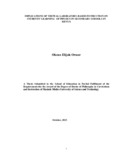Please use this identifier to cite or link to this item:
http://ir-library.mmust.ac.ke:8080/xmlui/handle/123456789/2625| Title: | IMPLICATIONS OF VIRTUAL LABORATORY-BASED INSTRUCTION ON STUDENTS’ LEARNING OF PHYSICS IN SECONDARY SCHOOLS IN KEN YA |
| Authors: | Okono, Elijah Owuor |
| Keywords: | Virtual Laboratory based instruction |
| Issue Date: | 2023 |
| Abstract: | However, in the recent years, low candidature has been witnessed at the Kenya Certificate of Secondary Education (KCSE) level in Physics, which can be attributed to low student motivation and consistent poor performance in the subject. For instance, in the years 2016, 2017, 2018 and 2019 Kisumu County registered low mean scores of 4.23, 4.98, 4.67 and 4.10 respectively in Physics in KCSE. Therefore there is need for incorporation of more effective teaching strategies for performance in Physics to improve, and for students’ interest and attitude in learning the subject to change.The implementation of relevant teaching strategies is critical in driving students’ active classroom participation in achieving learning outcomes in Physics. To this end, it is impossible to ignore the importance of Information Communication and Technology (ICT) integration in the teaching of Physics in Kenyan secondary schools. Particularly, virtual reality devices are becoming increasingly common and useful in the teaching and learning processes. Enhanced with virtual reality technology, Virtual Laboratory-Based Instruction (VLBI) has the potential to make unobservable phenomena accessible in any school, leading to significant progress in the acquisition of science process skills. Technology-based or technology enhanced learning leverages all learners, irrespective of their traits or socioeconomic situation. This study aimed at establishing implications of integration of VLBI on students’ learning of Physics in Secondary Schools in Kenya. This study was guided by the following objectives: to establish the effect of VLBI on students’ level of interaction in classroom; to establish the effect of VLBI on students’ achievement; to compare the frequency of use of experimental teaching approach between VLBI classroom and physical laboratory classroom and; to determine the relationship between teachers’ knowledge on selected ICT frameworks and the use of VLBI. The study was supported by behaviourism and connectivism learning theories and adopted Solomon- Four Group- quasi experimental research designs. The study's target population consisted of 3,500 Physics form three students and 88 Physics teachers from 230 Kisumu County public secondary schools. Physics teachers were purposively sampled from each of the schools selected. There were 358 students and 72 teachers as the sample. Data collection was done using Physics Teachers Questionnaire, Physics Achievement Test for students, Physics Students’ Questionnaire and Lesson Observation Schedule. Data presentation was made using frequency tables, figures and analysed using inferential statistics. The inferential statistics involved the use of ANOVA, t-test, multiple regression analysis and Duncan post-hoc tests. Qualitative data was analysed thematically. Results of the study indicated significant differences between experimental groups and control groups on level of classroom interaction (F=123.3, p< 0.05), achievement in physics (F=115.7, p< 0.05), and number of experiments conducted (119.97, p< 0.05). However, the study established that there was no significant difference (F=1.174, p> 0.05) between teachers’ knowledge and use of VLBI. The study concluded that 64.5% of variance in the VLBI was explained by learners’ interaction in the classroom, learners’ achievement, number of virtual experiments conducted and the teachers’ knowledge on the selected ICT frameworks. The findings generated from this study may give educational researchers, planners and secondary school teachers an opportunity to design and put into practice various classroom based innovations that would enable seamless integration of ICT in classroom instruction. |
| URI: | http://ir-library.mmust.ac.ke:8080/xmlui/handle/123456789/2625 |
| Appears in Collections: | School of Education |
Files in This Item:
| File | Description | Size | Format | |
|---|---|---|---|---|
| Okono Elijah Owuor.pdf | 3.37 MB | Adobe PDF |  View/Open |
Items in DSpace are protected by copyright, with all rights reserved, unless otherwise indicated.
